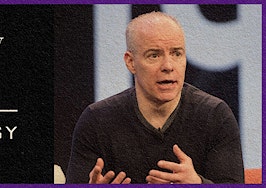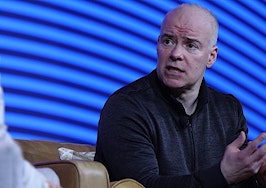Realogy CEO Ryan Schneider believes the current COVID-19 health crisis and the economic slowdown that accompanied the pandemic could lead to a flight to both scale and established brands, two of Realogy’s biggest value propositions.
“Overall, I think there’s an opportunity for companies with great brands and great size to do more to own the recovery and I think we can do that together across Realogy and across our franchise base,” Schneider told franchise owners this week, during a video conference obtained by Inman.
Schneider told the franchisees that, as a company, Realogy moved early to protect jobs and healthcare for employees, while making moves to cut costs and get ahead of falling home sale demand. But at the same time, they made the conscious decision to continue to invest in some things like technology, data, the company’s learning platform, and other tools to protect agents and brokers for the future.
“We are going to play offense and defense, I think you should too,” Schneider said. “There are places where we are going to continue to invest, we have not stopped recruiting, we’ve not stopped recruiting companies. At the same time, we all should be making the prudent moves — and many of you have — to make sure we get through this crisis with the kind of financial rigor we’re all shooting for.”
“I think our franchisee network is in better health than in previous crises because there’s been some consolidation and we’ve got a stronger and stronger group of franchisees over time, but also because I think people in our industry really did learn the lessons from the last crisis,” Schneider added. “I was excited at the speed I saw of a lot of our franchisees move to shore up our business through the rough ride here that COVID-19 is clearly creating out there in some manner, no matter what geography you’re in.”
Looking at the market, Schneider shared with franchisees that company data seems to show that declines in home sales peaked in mid-April. On the company’s most recent earnings call, Schneider went into depth about the overall market impact from COVID-19.
He was quick to say he’s not declaring the industry out of the woods yet, but the data shows that, as markets are starting to re-open, new listings are increasing.
Like many other companies, Realogy is currently re-evaluating how the company works, overall. It’s still discouraging people from coming into the office, unless it’s absolutely critical, Schneider said, but the company has also learned a lot of lessons on how it works best, as a result of stay-at-home orders.
“I have found an amazing number of things of, not only can we do them remotely when we didn’t think we could before, but the productivity is higher and the employee satisfaction is higher,” Schneider said. “Even the agent satisfaction is higher sometimes.”
“I found other things that we’re doing remotely that don’t have those characteristics so we have to find a safe and healthy way to get people back to those interactions in a way that is more effective for our agents, franchisees or relocation clients.”
In addition to company support, Schneider also emphasized the importance of government support, noting that many Realogy franchisees have taken advantage of benefits included in the CARES Act. Schneider spent the first part of the call discussing other government initiatives with U.S. Senator Bob Menendez, who represents New Jersey, where Realogy’s headquarters is based.
“If we’ve learned anything from this crisis, we’ve learned that staying at home can flatten the curve and keep our families and our communities safe,” Menendez said. “It’s critical that congress builds upon what it did in the CARES Act and address the housing issues that are affecting Americans across the country today.”
The U.S. House of Representatives recently passed the HEROES Act, but the U.S. Senate has been debating its own stimulus package.
Menendez specifically said he’s been looking at ways to protect the housing finance system, including providing $75 billion in targeted assistance to keep people in their homes while they look for employment. That money could be used for mortgage payments, to pay utilities or stave off foreclosure.
He’s also keeping an eye on the liquidity in the mortgage servicing industry and providing $100 billion in rental assistance to make sure renters can stay in their homes while property owners can cover their own costs. Menendez also emphasized support to states and municipalities, tying the services they are able to provide to property values.
“Housing has always been a big driver of our economy and an essential part of building wealth for our American families,” Menendez said. “We need to preserve that.”










